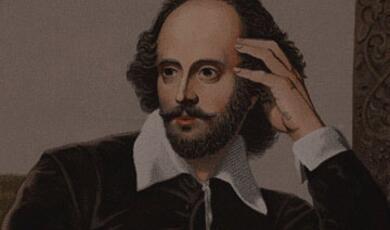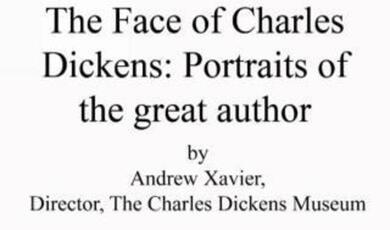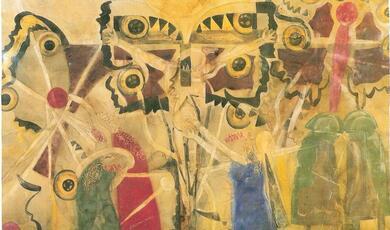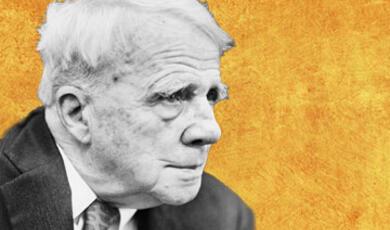Is Theatre History? The Alternative Explosion
Share
- Details
- Text
- Audio
- Downloads
- Extra Reading
Theatre can be seen as yesterday’s art form. The Greeks did it. Shakespeare did it best. We have just lived through the century of film and television. Now we are in the new digital age. Is the survival of the theatre now really threatened? If so, how should the challenge be met?
This is the second in a series of four 'Mondays at One' lectures on The Theatre in London. Other lectures in this series are as follows:
London Theatre: Past Glories, Today’s Success and Tomorrow’s Opportunities
West End Theatre in China
The Future of London Theatre
Download Text
8 October 2012
Is Theatre History?
The Alternative Explosion!
Sam Walters
“The theatre is thriving.” (last Monday’s Evening Standard)
Compared with when I was a young man with only the Royal Court, Stratford East and the Old Vic outside the West End, the theatre goer of today is spoilt for choice – too much choice one might think.
There have it would seem often been periods of theatre explosion, times when theatre dominated – the Elizabethan/Jacobean period, the Restoration and the end of the nineteenth/beginning of the 20th century – with Chekov, Ibsen, Strindberg, Shaw, Granville Barker and the beginning of modern theatre. And then nearer to our own time there was 1956 and the Royal Court and around 1968 the fringe/alternative movement that is still with us today.
Theatre reflects the times and the 1960’s were a great period of change and indeed of “revolution” – anti-Vietnam War demonstrations, sit-ins at universities, the French government nearly brought down by a combination of workers and students, the Prague Spring and its repression by the Soviet Union and in this country Carnaby Street, the Beatles, mini-skirts, the end of the criminalization of homosexuality and the abolishing of the Lord Chamberlain’s office and the censoring of plays.
Theatre in the UK reflected those times - the first wave of perhaps politically and socially motivated performers wanted to take theatre to the factory gates and out into the villages, the second wave started theatres in upstairs pub rooms and basements. No censor now - clothes could come flying off and language was free to be hurled at the audiences. There was an explosion of activity.
Of course many of the companies, and the people who drove them, have now disappeared, so perhaps has some of the excitement and spontaneity. Those that have survived have now become part of the establishment and put down concrete roots – the Tricycle, the Bush, The Soho and the Orange Tree and the newer and perhaps grander boys The Almeida and the Donmar. And now being, alas, grown up we have to grapple with the consequences – rules and regulations, health and safety, governance, forward planning, the providing of information and a plethora of application forms.
But there are now new boys and girls on the block, as the indomitable Blanche Marvin, now well into her 80s, and her virtually one woman band make clear when awarding the Peter Brook Empty Space Awards (This year’s happen next month as does Blanche’s appearance on Desert Island Discs!)
Theatre today is now very respectable. It was not always so. The rot I suppose set in when Henry Irving was given his knighthood. 50 years earlier polite society was very wary of Edmund Kean, but by the end of the 19th century Irving’s knighthood was followed by many others. Mind you fathers may still have thrown thespian inclining daughters out of the house on the grounds that they were becoming to all intents and purposes members of an immoral profession well into the 20th century and certainly when I was young (the 1950s) theatre was entirely discouraged as any sort of profession for anyone who had a possibility of doing something else.
But today it really has all changed. Theatre/drama is a school subject. In the early 1950s one university drama department had just been created, in the face of considerable opposition, at Bristol. Now they are all over the place. And television brings reality performing competitions into everyone’s home and thousands of people aspire to be performers of one kind or another and are encouraged to do so. There are no objecting fathers now. After all we live in the celebrity age.
BUT, BUT, BUT, when the young study drama/performing arts at school, when they do a course at university is it to the theatre that they are looking? Or is it to film and television and now indeed to other digital forms of communication? Do the young, who on the face of it seem to have theatre/drama and performing as part of their lives, take an interest in theatre?
Questions:
If drama/theatre is a school subject, is it something that you go out and do for fun on a Friday night? (SJT story).
So are theatres very right to be worried when they observe that their audiences are elderly?
Does studying drama really mean studying film?
And also has the new digital media with YouTube, Facebook and Texting and Tweeting turned almost everyone into show-offs who want to parade themselves in public?
Have we turned everyone into potential performers and lost an audience?
Are people going to want to sit still, quiet and attentive in the theatre and become the audiences of tomorrow or…
Is the theatre, despite some appearances, in fact yesterday’s art form? Is theatre as we knew it already history?
Once upon a time if you wanted to tell a story or have one told to you theatre/plays were they only way it could happen. There were no papers, no magazines, no novels. So Shakespeare and his contemporaries had it all their own way. A writer wrote plays (perhaps some wrote epic poems, but plays were the thing).
The 19th Century became the century of the novel and the quality of plays diminished. But the star actors – Kean, Macready, Irving – still dominated.
Then at the end of the 19th Century, as I have already implied, from roughly 1890 to the First World War there was a hugely fertile time for the theatre. This was partly because, as with other flourishing periods, it was a time of political and social change – there was Irish Question, the foundation of the Labour Party, the campaign for Votes for Women, then Revolution in Russia and the First World War.
Not only were there the great playwrights, but there great directors too, especially Stanislavsky in Russia, whose basic ideas about what acting is and how to do it still hold sway today.
Modern theatre was being born. BUT ironically, at exactly the same time, film was being discovered.
And in our context the 20th century became in fact the century of first film and then of television. Stories could now be told and acted in new ways. For the first time the supremacy of theatre was going to be really challenged. Now with the 21st century and the plethora of television channels, DVDs, computers and even phones on which you can be entertained and with the ever expanding world of the new digital media, the threat continues.
Although theatre may have lost its dominance in the 20th century, it would seem that it has managed to survive, but will it survive in the future?
My contention is that it may survive but only if it utilizes and exploits what makes it different and unique. It must not try to rival or emulate what its competitors do, but rather re-trench and concentrate on what makes it different and special and if it does that it may find that the brave new world into which we have entered will, surprisingly, give live theatre a new lease of life.
But we must be aware that to the young of today theatre can seem like yesterday’s news. The Greeks did it rather well. Shakespeare did it better than anyone has ever done it since and his contemporaries were pretty good too. Who wants to be interested in something that was done best 400 years ago? Granny may have liked Noel Coward and the parents witter on about Look Back In Anger and Waiting for Godot, but what has that got to do with my life say the young?
“We have our own stuff and it is on film and we can download almost anything we want and we can eat and drink while we watch and we can stop it and take a break and we don’t have to go out to some special stuffy place and sit with lots of strangers, we can watch stuff at home or go round to a mates. And we can carry on receiving texts or even making phone calls if we want. And film is real”.
So can theatre compete?
Why should we bother? And if we do keep on with the good fight how should we do it?
We must ask ourselves: what makes theatre different? What justifies its continuation in our Brave New World?
What makes theatre special?
And the main answer to that is that: Theatre is a shared experience.
Nowadays we can shop online (how I disapprove of Waitrose offering me rewards to induce me to buy online instead of going to their shop, keeping the town centre alive and giving employment to cashiers and shelf fillers), get money from the bank (Dorcas question), we can communicate with our friends and even work from home, all without making contact with other human beings.
If we go to the cinema, watch television or a DVD or use our computer, it is a private activity. Our work and our leisure are more and more able to be solitary activities.
We travel on our own in enclosed cars rather than on public transport (and who wouldn’t given the choice you might say).
Life is in danger of driving us more and more apart.
If that is what we want then that is what we can probably easily have. The future could be solitary. BUT human beings are gregarious creatures.
So if our desire, our need is to have contact, if we want to be part of a group, to live in a community, if we want contact, both casual and meaningful, with other human beings then the theatre is a place, perhaps the place where we can get it.
Because theatre demands an audience, a group. It cannot work as a solitary activity.
You can watch television on your own. Even be alone in a cinema (the poor actors don’t know you are the only one watching. Anyway they have done their job far removed from you).
Theatre requires that the audience cease to be individuals and become a community and, having become a community with each other, they then form a community with the actors.
This of course is best achieved in a theatre in the round which is what the one I run in fact is. At the Orange Tree the audience surrounds the action and sees the play against a backdrop of fellow audience members. Everyone is forced into a relationship with other people, with each other. The end-on stage is of course a live experience different from film or television, but there is still an element of them and us. The audience has their space and the actors have theirs. And so it is in any thrust stage situation.
But with a real theatre in the round the whole dynamic of the experience is changed and something is created that is entirely different from the end-on film, TV, and computer experience that is now so much part of our lives.
(get audience to move seats into an in the round formation!!! This did not happen)
The audience is also required to behave differently. With film and television the directors’ control is considerable. He or she decides what you are to look at and for how long. The camera cuts from person to person, or place to place, to direct your attention where the director wants it, or to keep your attention alert. Even on a conventional stage I can place the actors to direct where you look. But in the round the power is yours. As the play is being seen from all four sides there is no upstage centre spot. The audience has to pay attention and decide for itself where to look and the actors in rehearsing the play can allow themselves to behave as required in the scene instead of merely pretending to do that while in fact making sure they are clearly seen from the side that counts. Theatre in the round demands real audience involvement.
If involving theatre in the round is the best form of theatre to face the future, then why are there so few of them I hear you cry!!
Well, as well as the end of the Victorian era leading to the beginnings of modern theatre it also led to the establishment of the Fire Brigades and electric light. With electricity replacing the flickering gas lights and the introduction of some kind of safety precautions good old theatre fires diminished and we have found ourselves lumbered with the architecture of a particular period both in terms of the buildings and the social divisions of the time. So the theatre we all first hear about is the dear old proscenium arch, and we experience it perhaps first as children in the form of a Pollacks Toy Theatre. And our first visit to the theatre may to a pantomime in a local pros. arch theatre and we have been indoctrinated to accept that as being what a proper theatre is. Then having preserved the buildings from destruction, the powers that be have slapped preservation orders on them. So Shaftesbury Avenue and Broadway and all our great regional cities, and pretty well ever where else where there were theatres, find that they have streets full of one particular specific historical form of theatre. Then when new theatres are built we want the productions to be able to transfer to these old spaces and we are too timid to create exciting new theatre spaces for the theatre of the future. So now I have to turn to form an alliance with Mr Joly and say what we need is a good old bonfire and until we have one the theatres in the round will, alas, remain in a minority and we are all the worse for it.
To sum up:
Theatre must acknowledge and be positive about being what it is. A place where the audience need to be involved and committed and respectful of fellow audience members and of the actors. Creating a shared experience.
It is also a place where ideas can be shared, where people can be provoked and outraged as well as stimulated and entertained. It is not by chance that one of the first places that repressive regimes clamp down on is the theatre. For in this gathering place, playwrights and their actors can encourage their audiences to think and to act. And how apt it was that the Velvet Revolution in Prague in 1989 should have taken place so largely in theatres and been led by the playwright Vaclav Havel.
The theatre can survive if it is true to itself and then it need not be consigned to the history books.
It is not therefore a place to send or receive texts! Or to tweet or to eat and drink (mention radio programme about films and food). And if a mobile phone goes off, let the play stop and the offender be ejected before the action continues.
When theatres today encourage food and drink being taken in and even talk of having a tweet zone, where, while watching, audiences are encouraged to tweet or text about what they are seeing (how can you possibly do that and be paying attention), they are apologising for interrupting our lives and ultimately will be signing their own death warrants.
Let us hope very much that we don’t and that the theatre as well as having a history will have a glorious future.
© Sam Walters 2012
Part of:
This event was on Mon, 08 Oct 2012
Support Gresham
Gresham College has offered an outstanding education to the public free of charge for over 400 years. Today, Gresham College plays an important role in fostering a love of learning and a greater understanding of ourselves and the world around us. Your donation will help to widen our reach and to broaden our audience, allowing more people to benefit from a high-quality education from some of the brightest minds.


 Login
Login







